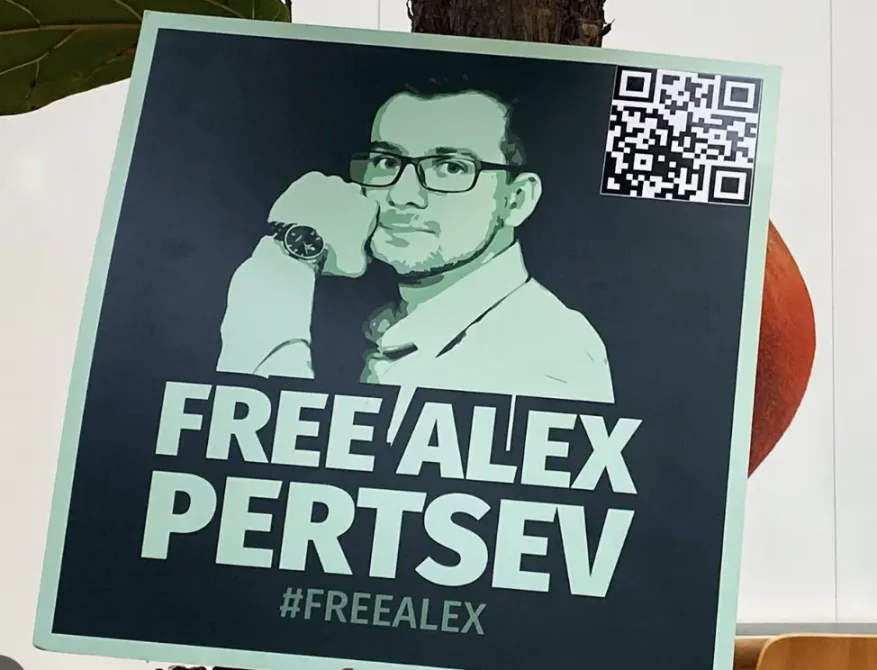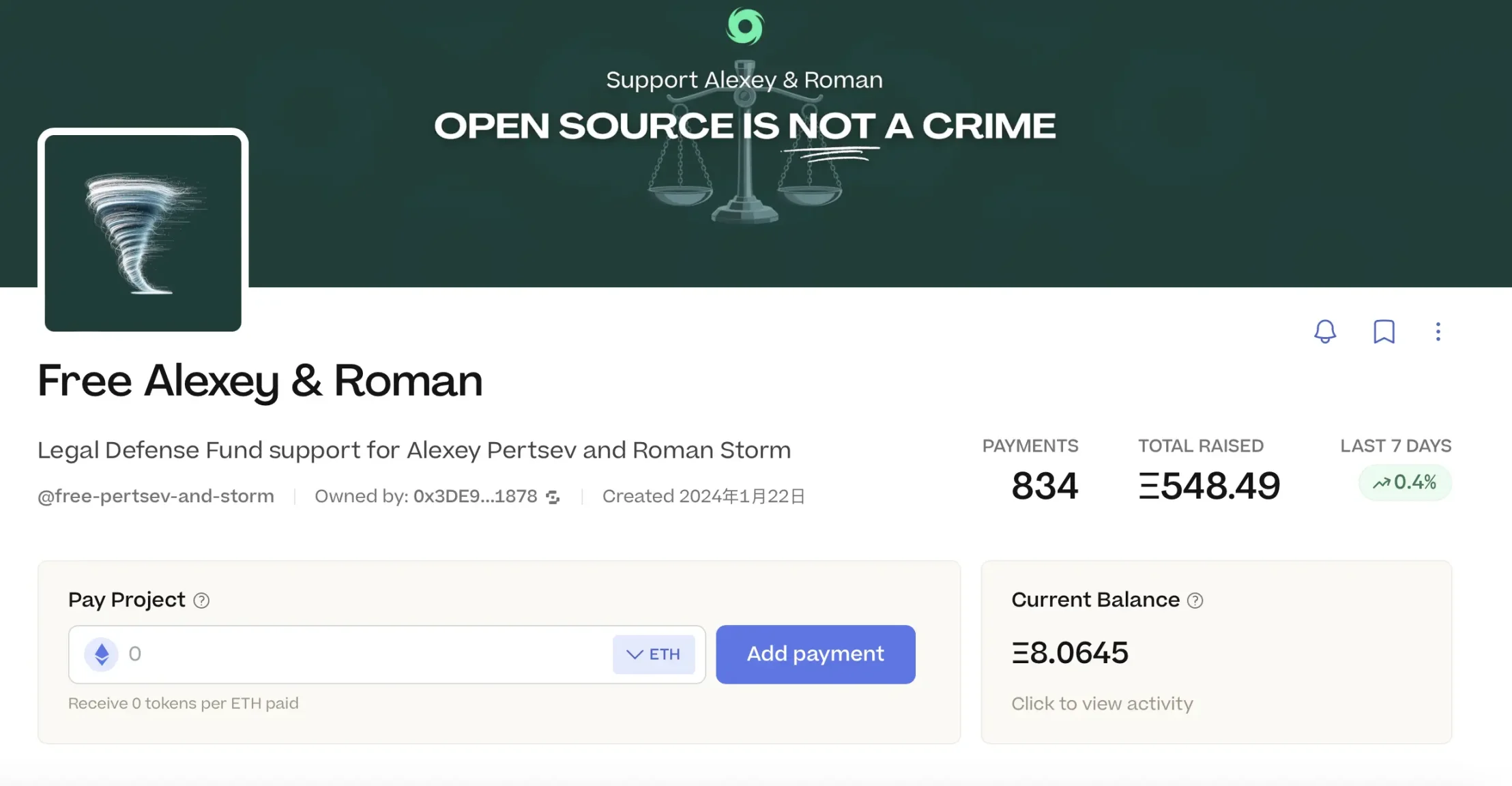Author: Nian Qing, ChainCatcher
Yesterday, Alexey Pertsev, a 31-year-old Russian citizen and developer of Tornado Cash, was sentenced to 5 years and 4 months in prison in the Netherlands for laundering $2.2 billion on a cryptocurrency mixer platform. Pertsev had previously been detained for eight months, which will be deducted from his sentence, leaving him with four and a half years. Pertsev's lawyer will have 14 days to appeal the judge's decision.
It is widely believed within the industry that this case is not only a watershed for DeFi regulation, but will also change the course of cryptocurrency privacy and have a "cicada effect" on the global open-source community. The conviction of open-source software developers signifies that Web3 smart contract developers will be subject to traditional legal constraints.
In the ruling of Alexey Pertsev's case, the judge and prosecutor stated that "the nature and function of Tornado Cash is a tool for criminals" and "Tornado Cash operates not only as a smart contract, but more like a company".
In August last year, Tornado Cash co-founders Roman Storm and Roman Semenov were charged with conspiracy to commit money laundering and conspiracy to violate the International Emergency Economic Powers Act, with a maximum sentence of 20 years in prison for both charges. In addition, the two were also charged with conspiracy to operate an unlicensed money transmission business, with a maximum sentence of 5 years in prison for this charge.
Currently, Roman Storm has been arrested in the state of Washington, USA, while Roman Semenov is still at large. Furthermore, Roman Storm's trial is scheduled for September 23. Alexey Pertsev's verdict will directly impact the outcome of Storm's trial.
It is worth noting that despite Pertsev's sentencing yesterday, the crypto community continues to transfer donations to the "Free Alexey & Roman" fund on Juicebox, with comments such as "privacy is not a crime", "code is speech", "defend freedom", and "XX stands with privacy and open-source public goods" in support of Tornado Cash developers and the "crypto spirit".
Tornado Cash Case Timeline
Tornado Cash was launched in August 2019 by the three co-founders Roman Storm, Roman Semenov, and Alexey Pertsev, with the main founding team being zkSNARK researchers, and Alexey Pertsev being a core member of the security audit company Peppersec.
The following is a complete timeline of events related to the Tornado Cash case (compiled from DL News, with additions and modifications by ChainCatcher):
2019
August 6: Tornado Cash is launched, allowing users to "send Ethereum cryptocurrency 100% anonymously".
September 13: The US Office of Foreign Assets Control (OFAC) imposes sanctions on North Korean cyber organizations, including the Lazarus Group.
2020
May 10: Tornado Cash completes a "trusted setup ceremony" burning the management permissions of all deposit pools and updating the smart contract. The Tornado Cash protocol becomes a permanently self-executing code not controlled by any party, which it calls "the world's largest trusted setup ceremony" with 1114 participants.
June 4: Tornado Cash developers deploy an optional compliance tool for users to choose to disclose their transaction history when needed.
September 25: Hackers steal $275 million worth of cryptocurrency from the KuCoin exchange. This is one of the largest hacking events connected to Tornado Cash by Dutch prosecutors.
2022
March 23: The Axie Infinity Ronin sidechain bridge suffers a loss of approximately $625 million due to a hacker attack. This is one of the largest cryptocurrency hacking attacks to date, with criminals laundering money through Tornado Cash.
May 6: OFAC sanctions the first virtual currency mixer, Blender, used by a North Korean cybercrime group.
June 24: The Lazarus Group attacks the Harmony Horizon bridge, transferring nearly $100 million worth of stolen cryptocurrency through Tornado Cash. According to Dutch prosecutors, this is another major hacking attack using Tornado Cash for money laundering.
August 8: OFAC sanctions Tornado Cash for laundering $7 billion.
August 9: The Tornado Cash website has been shut down, and the project's code repository has been removed from GitHub. Co-founder Roman Semenov's GitHub account has been suspended.
August 10: Alexey Pertsev is arrested in the Netherlands and imprisoned without public charges.
October 12: Coin Center, a non-profit organization focusing on cryptocurrency policy issues, sues OFAC over the Tornado Cash sanctions.
November 22: Dutch prosecutors disclose the charges for the first time in a court hearing.
2023
April 20: Alexey Pertsev is released pending trial.
August 23: The US Department of Justice charges Tornado Cash developer Roman Storm and sanctions developer Roman Semenov.
August 25: Tornado Cash co-founder Roman Storm has been released on bail.
December 7: Binance delists the native token TORN of Tornado Cash.
2024
March 25-26: Alexey Pertsev undergoes a two-day trial in the city of 's-Hertogenbosch, Netherlands.
April 5: The US Trade Association submits a brief to the court defending Roman Storm and addressing each charge against him.
May 14: Alexey Pertsev is sentenced to 64 months in prison for money laundering.
September 23: Roman Storm will stand trial in the US.
Controversy and Focus of the Trial: Identity Boundaries of Smart Contract Developers
The focus of the Tornado Cash case trial is whether current anti-money laundering laws are applicable to blockchain/cryptofinancial platforms.
During the trial, Pertsev's defense lawyer Keith Cheng stated that no one, including Tornado Cash developers, can prevent others from using open-source smart contract code. The contributor to a smart contract is a decentralized organization, not a single responsible person like a traditional company.
After Roman Storm and Roman Semenov were sued by the US in August last year, Coin Center expressed support, stating that the latest charges against Tornado Cash are contradictory to the Financial Crimes Enforcement Network (FinCEN) documents.
Their core argument is that Tornado Cash developers only provide "pure software development or communication services" and do not engage in "businesses that transfer funds on behalf of the public". Judicial authorities should not confuse "service providers" with "fund transfer identities". Tornado Cash's only control over smart contracts is to change the cryptographic logic related to privacy functions, and does not have the ability to actually view or move user funds.
In early April this year, Coin Center submitted a friend-of-the-court statement regarding the criminal case against Roman Storm in the Southern District of New York, expressing the hope that the court would remove the prosecution's vague and biased descriptions of Tornado Cash. They argued that open-source software developers cannot control the actions of others who happen to use their tools, and that the release of Tornado Cash code is protected by the US Constitution. Coin Center also believed that the prosecution's statements and judgment in this case are "relevant to anyone engaged in pure open-source software development, code release, and speech work," and called for the protection of the right to freely develop and release software in the United States.
In documents submitted to the Southern District of New York Court at the end of March, Roman Storm's lawyer also mentioned that as a non-custodial smart contract, Tornado Cash gives users full control over their assets without relying on any service provider or third-party custodian. Writing code falls within the realm of freedom of speech and is therefore protected by the First Amendment of the US Constitution.
However, in the trial on the 14th, the court rejected this viewpoint, stating that no technological innovation can override legal obligations to prevent platforms from helping criminals and sanctioned entities conceal the source of stolen assets. Prosecutor Martine Boerlage characterized Tornado Cash as "not only a smart contract, but operating like a company".
The US Department of Justice reiterated that its indictment has nothing to do with whether Tornado Cash's computer code has freedom of speech or is protected by the First Amendment of the Constitution. The defendants were not charged for releasing computer code, but for using it to facilitate profitable illegal businesses.
The Department of Justice further explained that banks use computer code to process financial transactions. If this code performs the work of a legally defined money transmitter, then the code is not just speech, but something that people must ensure is implemented in a way that does not violate money transmission laws. Tornado Cash is part of the code, part of speech, and part of business, and overall, it is a human creation. Storm did not just release code; he operated a business and made operational decisions for years. The Tornado Cash protocol is not equivalent to the business of Tornado Cash. Just because Tornado Cash has some open-source code does not mean that all of Roman Storm's actions related to that code as the owner of the Tornado Cash business are protected by the Constitution.
Petitions, Protests, and Donations
Cryptocurrency lawyer David Lesperance has stated that legally, Alexey Pertsev's case is more important for the future of DeFi than simple fraud cases against SBF and Do Kwon or Zhao Changpeng's failure to implement the necessary anti-money laundering protocols. Because the Tornado Cash case is highly representative, the three co-founders have received various forms of support.
The crypto community, especially the developer community, has strongly protested Pertsev's arrest. In addition to petitions and support on various social media platforms, posters supporting Alexey Pertsev were distributed outside the Dutch court earlier.

In August 2022, some anonymous crypto users even protested through a poisoning attack, sending a small amount of ETH to the addresses of well-known crypto figures through Tornado Cash to express their dissatisfaction with the US government's sanctions. Notable figures such as SBF, Justin Sun, Coinbase CEO Brian Armstrong, and artist Beeple were "poisoned".
Additionally, members of the crypto community launched a donation campaign on the crowdfunding platform Juicebox on January 22 this year, called "Free Alexey & Roman", to help Tornado Cash co-founder Roman Storm and developer Alexey Pertsev avoid legal penalties. As of the time of writing, the fund has received a total of 834 donations, amounting to 548.49 ETH, approximately $1.6 million. Ethereum co-founder Vitalik, Kraken co-founder Jesse Powell, and others have donated to the fund.
It is worth noting that after Pertsev's sentencing yesterday, the number of donations continued to increase, and people also left comments such as "privacy is not a crime", "code is speech", "defend freedom", and "XX stands with privacy and open-source public goods" in support of Tornado Cash developers and the "crypto spirit".

The Other Side of the Coin
Despite Pertsev's insistence that he is just a programmer with no criminal intent, he expressed "disappointment" at criminals using Tornado Cash to conceal illegal gains, but felt powerless to stop it.
When the judge asked Pertsev if he took the criminal behavior seriously, the court brought up chat records between Pertsev and co-developers Roman Storm and Roman Semonov, where Pertsev responded with "haha" to the news of the $625 million Axie Infinity Ronin Bridge being hacked. However, Pertsev stated that this did not mean he found it amusing, but it was his habit to express surprise.
Furthermore, an objective fact is that Tornado Cash remains the largest cryptocurrency mixer since being sanctioned, and hackers and protocol attackers continue to use this tool for money laundering.
On one hand, the sentencing of Tornado Cash developers threatens the future of technological development and privacy. On the other hand, the reality is that from a legal perspective, technology cannot be neutral and is inevitably built on relationships between people.
免责声明:本文章仅代表作者个人观点,不代表本平台的立场和观点。本文章仅供信息分享,不构成对任何人的任何投资建议。用户与作者之间的任何争议,与本平台无关。如网页中刊载的文章或图片涉及侵权,请提供相关的权利证明和身份证明发送邮件到support@aicoin.com,本平台相关工作人员将会进行核查。



